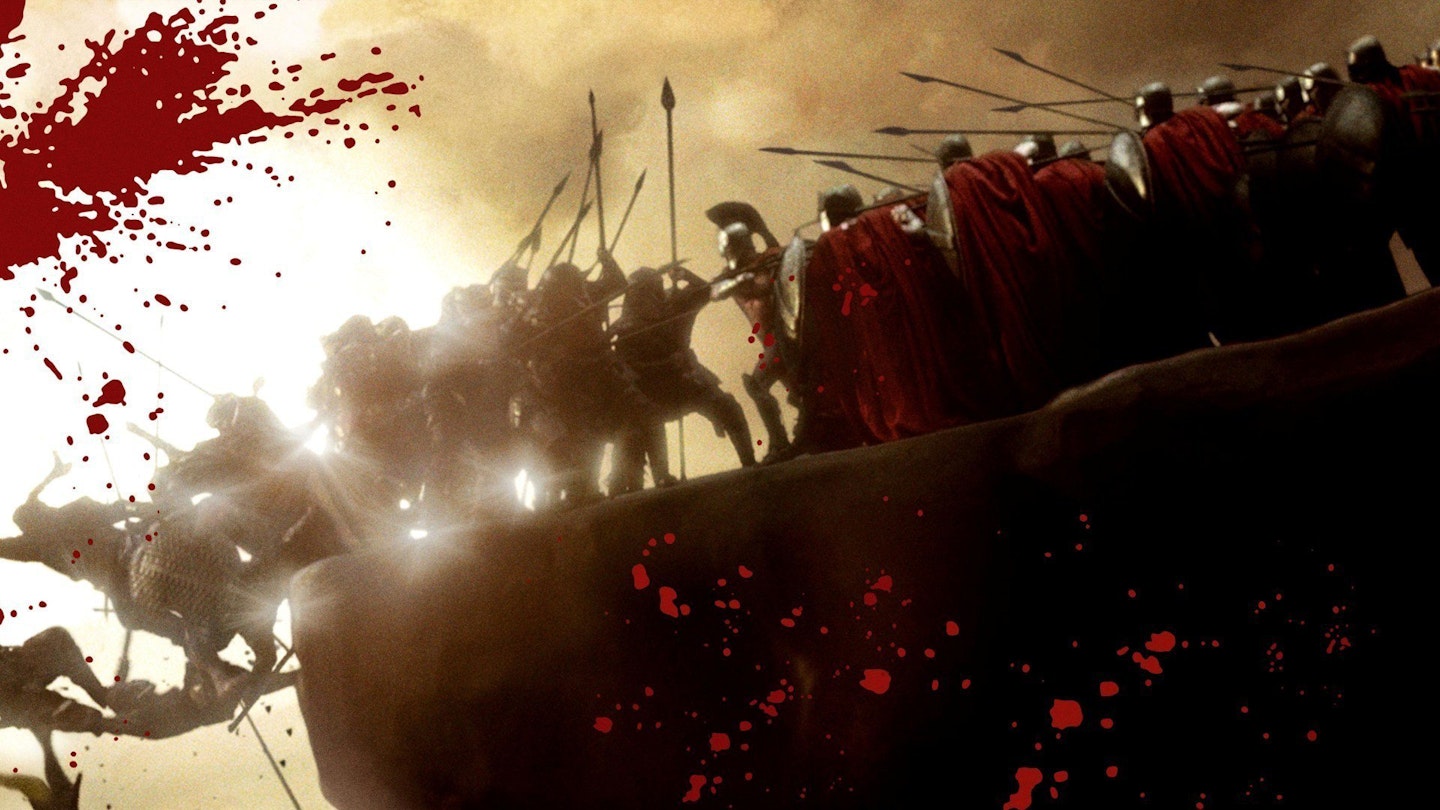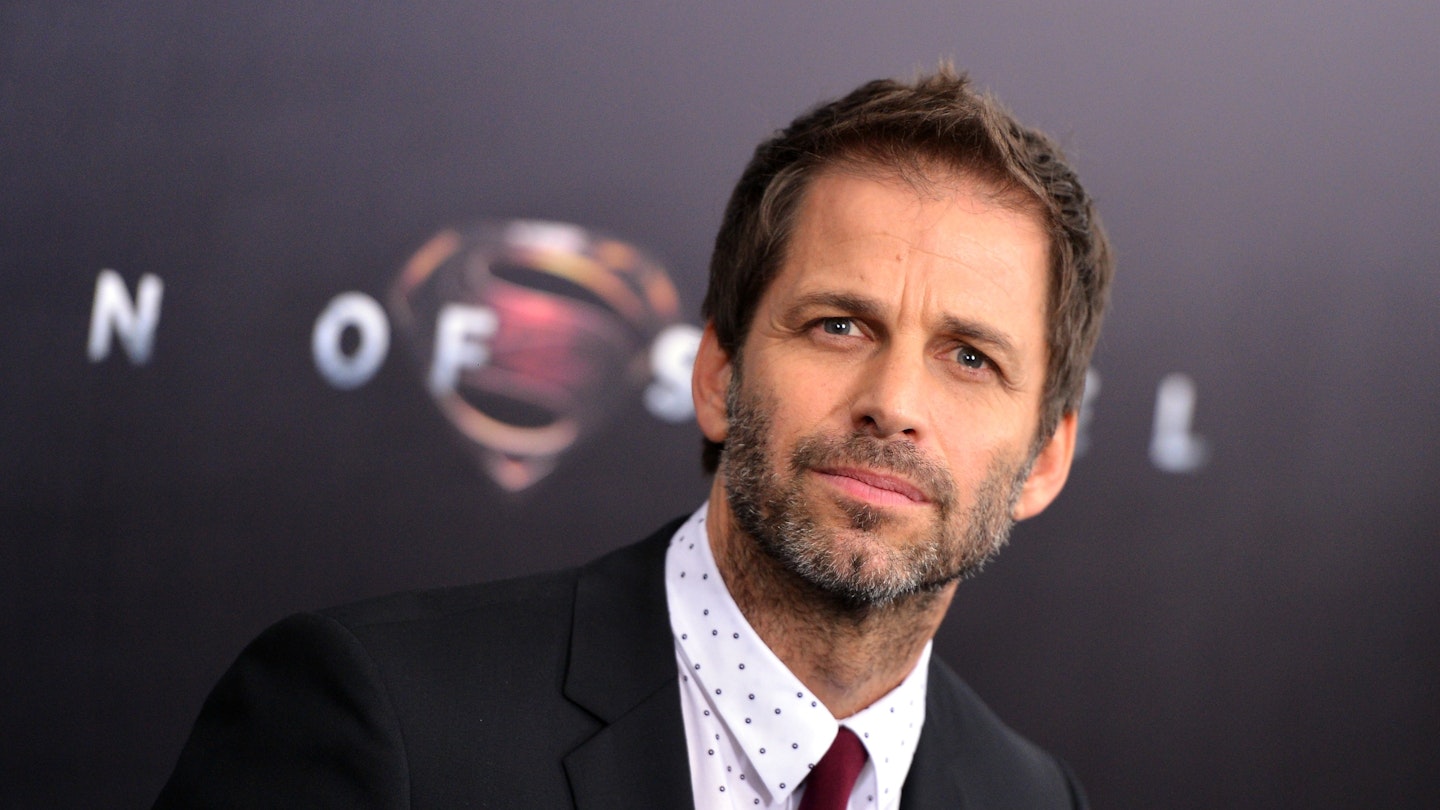The word ‘Spartan’ nestles in the English lexicon as a synonym for words like ‘austere’ and ‘disciplined’. But while the Spartans of ancient Greece were all those things and more, none of these locutions captures the essence of this unique people. A better modern-day equivalent to ‘Spartan’ might be ‘belligerent nutcase’, and anyone in doubt need look no further than 300, which stands as an opulent, brutal and bloody declaration of that fact. An adaptation of Sin City creator Frank Miller’s graphic novel, 300 recounts the country’s finest hour: Sparta kicked plenty of ass over the ages, but it was at Thermopylae, in 480 BC, that she earned eternal renown. What those warriors achieved in life (and lots of death) still echoes through eternity.
Trumpeted by its makers as “Gladiator meets Sin City”, the cinematic rendition of 300 is fiercely loyal to its bronze-and-crimson-coloured graphic progenitor and, as such, is as far removed from reality as the last batch of Celebrity Big Brother housemates. Thermopylae was a real battle, the opening salvo of the Second Persian War no less. The Spartan king Leonidas, played here by Gerard Butler, did defend the ‘Hot Gates’ in Northern Greece with 300 hoplites, against an invading Persian army that Herodotus, the ‘father of history’, numbered at one million strong. While modern scholars insist that the Persian horde, vast as it was, totalled no more than 200,000 men, Miller and Snyder prefer Herodotus’ estimate. They also lift from his dialogue (“Then we’ll fight in the shade” is a line from the great historian, for example), although both happily depart from his source material when counting colossal elephants among the Persian forces.
Still, much like a football match between England and Brazil, 300 vs. 200,000 is hardly a fair contest, Leonidas and co. facing laughably overwhelming odds. Unlike the English football team, however, they offered a remarkable display of mettle — and indeed metal — against an army hundreds of times their size. Their story is the stuff of legend, and that thought was paramount in Miller’s mind when consigning his vision to the page. For Miller’s intention was that 300 should be historically _in_accurate — this was his bid to mythologize an actual event, lending to it the power and grace (and a healthy amount of exaggeration) normally associated with classical epic. If the battle at Thermopylae had occurred a millennium earlier, it would no doubt have formed the basis of a legend every bit as fantastic and entertaining as the works of Homer (much more lively than the pallid cinematic offering that was Troy, based on Homer’s The Iliad).
It’s somewhat ironic that whereas Troy, retelling a story rooted in myth, sought to present a world devoid of the unusual, 300, while recounting a story drawn from fact, is as fanciful as any Homeric yarn (cue fat freak with sharpened tusks for arms and a bard with a goat’s head). Snyder is entirely faithful to Miller’s intent, however, and he has cooked up an astonishing visual feast, spinning a tale that at times mimics the graphic novel frame-by-frame, the raucous content just what you’d expect to hear from some ancient, toothless sage telling hero tales around a campfire. In fact, the film is framed as a saga related by the storyteller Dilios (David Wenham, neither ancient nor toothless). It is this mythic conviction that underpins the film’s failings and informs its successes.
Chief among the latter stand the Spartans themselves, Butler and co. sporting as much muscle as a bouncers’ convention and offering a convincing portrayal of a Spartan crack troop. Fighting in nothing more than big pants, helmet and shield, there are more six-packs on show than at an Aussie off-licence, but they largely manage to convey hard-assedness rather than homoeroticism. The Spartan battle formations and fighting styles are entirely accurate, and some of the battle choreography ranks among the finest committed to film. Snyder makes us believe that these Spartans really could dispatch 100 inferior men apiece, and still have the energy to run a marathon afterwards. Crucially, Butler convinces as a leader of men, bellowing orders, wisecracking or bolstering confidence as the occasion demands, leading from the front and laying out several battalions’ worth of the enemy. Leonidas — noble, stubborn and deadly when roused — may be not be complex, but Butler has the conviction and charisma needed to carry it off.
Sadly, he’s hamstrung by the film’s structure and, ultimately, by its direction. The film shoots for epic from minute one, demanding our awe before it’s been earned and painting with strokes so broad that it’s hard to make out such niceties as character, motivation or period detail. Snyder came to the fore with 2004’s Dawn Of The Dead remake, after learning his trade in the world of commercials, and 300, at times, looks a little like a heavy metal video. At one point, when the Spartans trudge forward to engage their enemy, it sounds like one too, a raging torrent of testosterone that is as merciless in its stabbing delivery as the Spartans themselves. In truth, the music is more than a little overcooked throughout, especially in the Gladiator-lite scenes amid the waving barley. And Snyder loves that slo-mo button, ramping the speed of the action up and down during the fight scenes, the better to move smoothly from kill to kill — a technique which, used sparingly, works beautifully, but is indulged too much during the otherwise storming middle act.
That said, Snyder does bid to temper the testosterone levels by injecting a little oestrogen, courtesy of Queen Gorgo (Lena Headey). The Spartan queen is glimpsed in Miller’s work, but Snyder pushes her further to the fore. Her heartfelt speech to the Spartan assembly, while a little public school debating society, is at least couched in believable language, spilling from the tongue of a character who has some claim on our affection. Something which cannot be said of Leonidas and his Spartans.
Nothing is more epic than the tradition of the defiant David standing up to a mammoth and all-powerful Goliath — Homer knew it; Leonidas knew it; Frank Miller knew it; and after watching 300, you will know it too. But you’re unlikely to care, for such is the nature of myth and epic that characterisation and language exist only to serve the story. For all their bravery and bluster, Spartan deaths or injuries pluck no heartstrings — we neither know these men nor care about their fate. For all Butler’s verbal anguish and warrior dexterity, he and his 300 are cartoon characters, simple archetypes of ancient epic, spitting vitriol and wielding weapons but ill-equipped to connect to those watching them on screen. The result is that the conclusion of this, one of the greatest stories ever told, is sadly fumbled.








